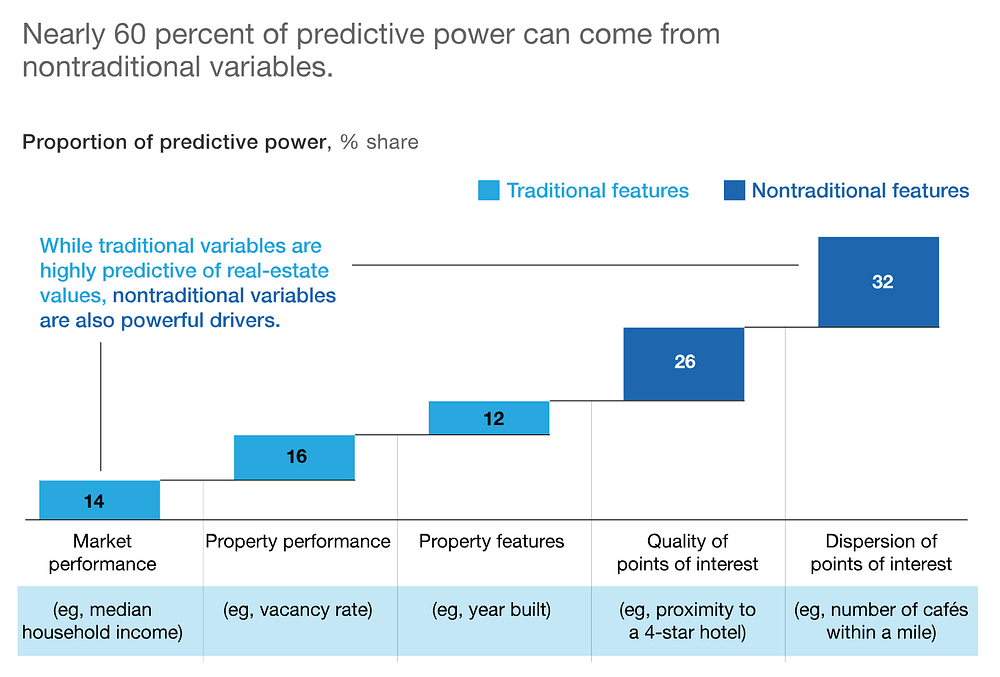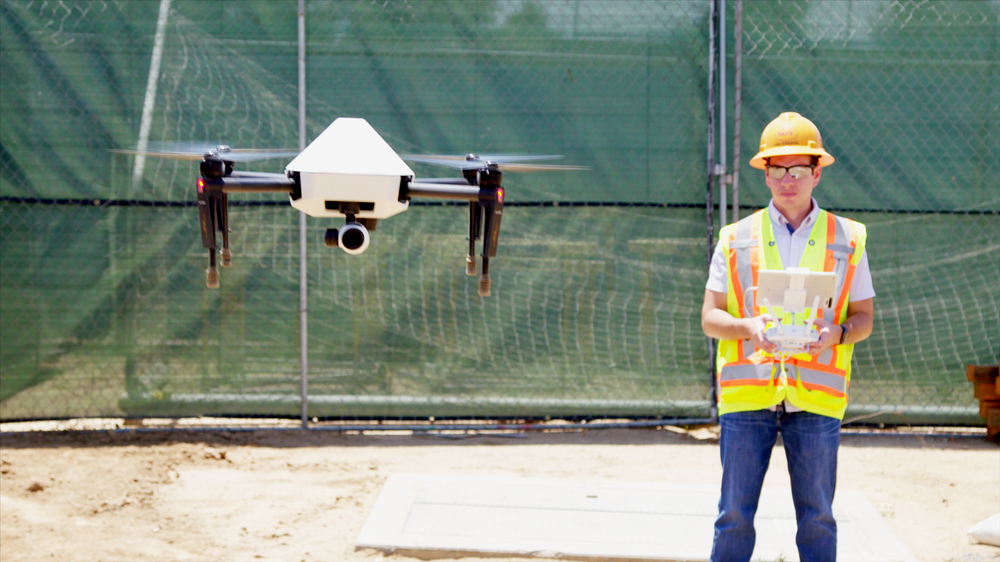
At Blue Future Partners we invest in both Real Estate and Technology. After having described our Proptech framework, we now want to illustrate how different technologies are shaping the future of the real estate vc industry.
Historically, real estate has lagged behind other industries in embracing innovation. However, a big shift is happening in this industry, with investments in real estate tech rising from $33 Million in 2010 to over $5 billion in 2017.
Transformative technologies such as AI and robotics, 5G, big data and blockchain can potentially unlock value along every step of the real estate value chain and offer enormous opportunities for new Proptech companies.
Here below are described the 7 ways technology is disrupting the real estate vc industry:
1. Development
Developers normally make investment decisions by analysing traditional data such occupancy rates or property prices, and combining it with their personal intuition. However, the omnipresence of digital devices and improvements in big data analytics are making an ever-growing amount of previously non-existent data available to developers, enabling them to gain better insights.
Non-traditional data, such as traffic information from GPS, can identify hyperlocal trends that show how an area is changing. Developers today are able to take advantage of new sources such as Yelp or Google Maps and make better predictions about areas with potential for price appreciation. An example is the Tel Aviv-based startup Skyline AI, that is democratizing real estate investments with machine learning and data analysis techniques that support investment decisions.

(Source: McKinsey)
Another trend that will disrupt real estate development is the rise of self driving cars. Autonomous vehicles and new means of transportation, such as ridesharing or the Hyperloop, will allow passengers to spend their travel-time working and not driving. This will make it easier to commute from more distant places and increase the attractiveness of suburban areas. Self-driving vehicles will also reduce individual car ownership and allow cars to park themselves closer to each other, reducing the need for parking lots and freeing space for other purposes.
2. Financing and Buying
Real estate is not only the single largest asset class in the world, but also the most imperfect. It is plagued by high transaction costs, asymmetric information, a high number of stakeholders and dissimilar product offerings.
One technology with the potential to tackle these inefficiencies is blockchain, which offers several interesting applications to real estate.
First, blockchain could enable the ownership of an asset to be completely digitized (or “tokenized”), meaning that landlords could sell portions of the property on the blockchain. In late 2018, a $30M apartment in Manhattan was tokenized on the Ethereum blockchain, allowing it to be “divided” and digitally purchased in small parts. Blockchain has also the potential to disrupt real estate transactions between two parties, increasing transparency and reducing the risk of fraud: Smart contracts recorded on virtual protocols could prove the legitimacy of a deal and reduce the need for intermediaries in transactions.
Fintech and insurtech startups are equally hoping to take a bite out of the real estate market by changing the way we buy and insure homes. Startups such as Ribbon or Flyhomes, for example, provide customers with money so that they can make all-cash (and therefore cheaper) offers to sellers, even when a mortgage is not yet secured. Another interesting example is Divvy, that provides an alternative way to buy a property by offering customers the opportunity to gradually purchase a house over time with a hybrid model that combines rent and ownership payments.
On the insurance side, startups such as States Title are disrupting the real estate industry by leveraging technology to scan records faster and offer cheaper policies.
3. Building Design
5G will not just drastically change our digital experience by creating a quantum leap with internet speeds that are 10x faster than broadband. It will also impact how buildings are designed. The reason is that 5G requires a vast network of micro-data centers, antennas and cellular towers to work, and therefore building design will have to be adapted to enable fast internet connectivity.
In addition, technology is similarly disrupting also how the space inside a building is used, as real estate companies are starting to apply machine learning to optimize their building layouts. One example is the co-working provider WeWork, who trained a neural network to predict the best distribution and size of spaces for meeting rooms: The algorithm is 40% better than humans in predicting space usage.
4. Construction
The construction industry is one of the least digitized industries globally, since real estate innovations have happened mostly in the early or late phases of a project, but this is starting to change.
Although still early, one of the most exciting applications of technology to construction is 3D printing.
Building a property can be very labour- and resource-intensive. In addition, many countries have serious shortages of construction personnel and especially bricklayers. New startups are creating a paradigm shift in how houses are built by applying 3D printing technology to construction. They are developing movable printers that automatically put layers of cement on top of each other to form full buildings. For instance, in 2017, Apis Cor from Russia was the first company to unveil a fully 3D-printed residential home.
Drones constitute another technology that, despite not being immediately associated with construction, has very useful applications in this sector. In fact, Goldman Sachs predicts the biggest take-up of commercial drones to be in this industry, with a $100 billion market opportunity between now and 2020. Drones can transport materials, surveil sites and make detailed aerial analyses of complex terrains, as it does the machine vision technology developed by Skycatch*.

(Source: Skycatch)
5. Viewing and Renting
While starting the search for a new home or apartment online is the standard nowadays, the sale and rental process of real estate properties remains a people-focused business. However, this is changing too, thanks to startups such as Rently and Zenplace, that have developed self-showing technologies which allow renters to visit a property by themselves, without an agent. Their innovations include smart locks that let renters enter into the house, as well as movable video monitors connected to an agent who can show the property through a virtual tour while sitting at the office.
Other companies are helping in the rental process before the house is even built. One of them is Realar, a startup from Australia that developed an augmented reality app to visualize how a home will look like in the terrain where it will be built. Moreover, Virtual reality can be used by real estate agents to create detailed visualizations and to show the interior and exterior of a building that does not exist yet.
6. Building Operations & Asset Management
Mobile security robots patrolling car parks. Delivery robots bringing towels to guests. Laundry robots that automatically wash and fold clothes of hotel guests. What sounds like science fiction is a reality today, with robotics being increasingly deployed in commercial real estate to help operators manage their properties.

(Source: Savioke)
Robotics in real estate does not just refer to physical, R2D2-like machines, but also to software systems. Robotic Process Automation (RPA) is the term for SaaS software that automates very repetitive processes inside companies. One example is the startup UiPath, who adds value to organizations by applying RPA to tasks in the back-office like invoicing, renewals or payments.
Robotics is only one type of technology to help landlords manage their property more efficiently. There are property management tools like Allthings Technologies* that digitize tenant-landlord relationships, or smart detectors like Nest Protect that send out notifications for smoke alerts.
7. Tenant Experience
Of course, real estate tech is as much about making life easier for tenants as for landlords. Software startups such as Teem optimize the way companies use their meeting rooms. Chat tools (Slack, Trello) and video-messaging apps (Loom) improve communication in teams and make remote work easier. These tools do not just change how we work, but also where we work.
Along the way, companies are inventing entirely new business models that will disrupt long-established players. The combination of real estate and technology, along with the overarching trend of consumers being more interested in convenient services than owning products, has led to the rise of a completely novel category of real estate companies, offering Space-as-a-service.
Real estate tech companies such as Airbnb, WeWork, Common (coliving), Clutter (storage) or b8ta (retail) all have one thing in common: None of them initially owned any real estate assets. They just conveniently and flexibly sell space as a service, and they are having tremendous success by creating new categories.
Airbnb and WeWork are the second and fourth highest valued startups in the US respectively, with Airbnb estimated to be worth more than any other hotel chain. This demonstrates the massive potential of finding the right applications of technology for the real estate industry.
* BFP holds a small stake in the company through an indirect investment.
Sources:
CBS Insights — WeWork’s $20 Billion Dream: The Lavishly Funded Startup That Could Disrupt Commercial Real Estate
CNBC — There are more renters than any time since 1965
Deloitte — Data is the new gold: The future of real estate service providers
EY — How Robotics Process Automation (RPA) Will Disrupt Real Estate
Forbes — Three Ways Blockchain Technology Will Revolutionize Real Estate in 2019
Forbes — This Real Estate Startup Uses Data Science to Predict Home Listings Before They Happen
Goldman Sachs — Drones: Reporting for Work
IDC — IDC’s Worldwide Semiannual Smart Cities Spending Guide Taxonomy, 2H17
McKinsey — Getting ahead of the market: How big data is transforming real estate
Roland Berger — Digitization of the construction industry
Stanford — Digital Cities: Real Estate Development Driven by Big Data
Techcrunch — How 3D printing is revolutionizing the housing industry
WeWork — Designing with Machine Learning








